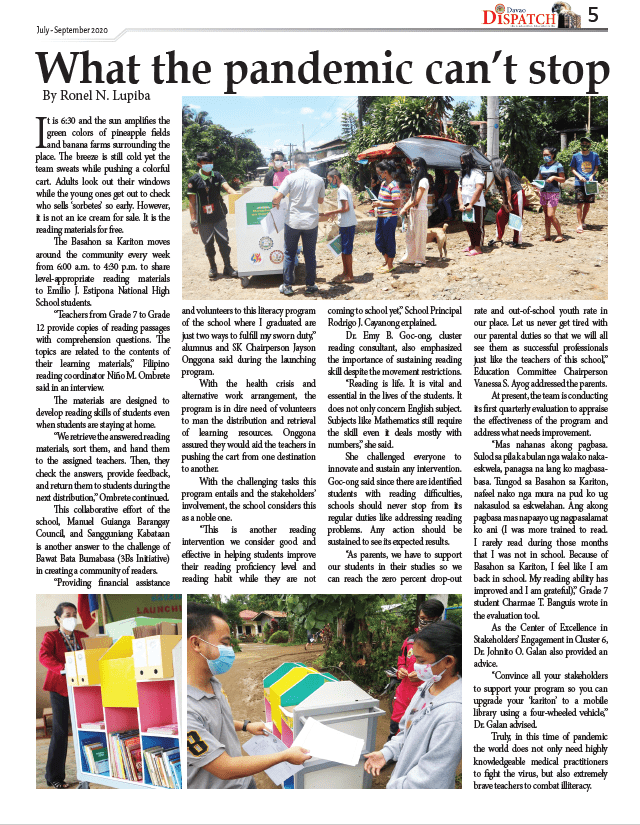
What the pandemic can’t stop
It is 6:30 and the sun amplifies the green colors of pineapple fields and banana farms surrounding the place. The breeze is still cold yet the team sweats while pushing a colorful cart. Adults look out their windows while the young ones get out to check who sells ‘sorbetes’ so early. However, it is not an ice cream for sale. It is the reading materials for free.
The Basahon sa Kariton moves around the community every week from 6:00 a.m. to 4:30 p.m. to share level-appropriate reading materials to Emilio J. Estipona National High School students.
“Teachers from Grade 7 to Grade 12 provide copies of reading passages with comprehension questions. The topics are related to the contents of their learning materials,” Filipino reading coordinator Niño M. Ombrete said in an interview.
The materials are designed to develop reading skills of students even when students are staying at home.
“We retrieve the answered reading materials, sort them, and hand them to the assigned teachers. Then, they check the answers, provide feedback, and return them to students during the next distribution,” Ombrete continued.
This collaborative effort of the school, Manuel Guianga Barangay Council, and Sangguniang Kabataan is another answer to the challenge of Bawat Bata Bumabasa (3Bs Initiative) in creating a community of readers.
“As the SK chairman, it is my duty to help the youth sector in ensuring that they enjoy their right to free and quality education. Providing financial assistance and volunteers to this literacy program of the school where I graduated are just two ways to fulfill that sworn duty,” alumnus and SK Chairperson Jayson Onggona said during the launching program.
With the health crisis and alternative work arrangement, the program is in dire need of volunteers to man the distribution and retrieval of learning resources.
“As the head of Manuel Guianga Emergency Medical Services also, our group will aid the teachers in pushing the cart from one destination to another. I will divide the group into two: one in the morning and one in the afternoon to ensure that our service will continue,” Onggona assured the school.
With the challenging tasks this program entails and the stakeholders’ involvement, the school considers this as a noble one.
“This is another reading intervention we consider good and effective in helping students improve their reading proficiency level and reading habit while they are not coming to school yet,” school principal Rodrigo J. Cayanong explained.
The effort also reflects the mantra of Cluster 6 and that of the school.
“When you are in Emilio J. Estipona National High School with this group of teachers collaborating with community partners and other stakeholders, you will learn, grow, and reach your dreams because we serve you with excellence,” he added.
Dr. Emy B. Goc-ong, cluster reading consultant, also emphasized the importance of sustaining reading skill despite the movement restrictions.
“Reading is life. It is vital and essential in the lives of the students. It does not only concern English subject. Subjects like Mathematics still require the skill even it deals mostly with numbers,” she said.
She challenged everyone to innovate and sustain any intervention. Goc-ong said since there are identified students with reading difficulties, schools should never stop from its regular duties like addressing reading problems. Any action should be sustained to see its expected results.
To sustain the program, parents should actively involve themselves.
“As parents, we have to support our students in their studies so we can reach the zero percent drop-out rate and out-of-school youth rate in our place. Let us never get tired with our parental duties so that we will all see them as successful professionals just like the teachers of this school,” Education Committee Chairperson Vanessa S. Ayog addressed the parents.
At present, the team is conducting its first quarterly evaluation to appraise the effectiveness of the program and address what needs improvement.
“Mas nahanas akong pagbasa. Sulod sa pila ka bulan nga wala ko naka-eskwela, panagsa na lang ko magbasa-basa. Tungod sa Basahon sa Kariton, nafeel nako nga mura na pud ko ug nakasulod sa eskwelahan. Ang akong pagbasa mas napaayo ug nagpasalamat ko ani (I was more trained to read. I rarely read during those months that I was not in school. Because of Basahon sa Kariton, I feel like I am back in school. My reading ability has improved and I am grateful),” Grade 7 student Charmae T. Banguis wrote in the evaluation tool.
During the Regional Monitoring on Oplan Balik Eskwela, Dr. Brenda Belonio also provided feedback of the program.
“This is a very good program. To improve it, I suggest that you build more ‘kariton’, use bicycle or even motorcycle so you can cater more students especially to places that you cannot reach. You can also borrow books in the library hub so that students will have more options on what to read,” Dr. Belonio commented.
As the Center of Excellence in Stakeholders’ Engagement in Cluster 6, Dr. Johnito O. Galan also provided an advice.
“Convince all your stakeholders to support your program so you can upgrade your ‘kariton’ to a mobile library using a four-wheeled vehicle,” Dr. Galan advised.
Truly, in this time of pandemic the world does not only need highly knowledgeable medical practitioners to fight the virus but also extremely brave teachers to combat illiteracy. (By Ronel N. Lupiba)
This is page 5 of DepEd Davao Dispatch 3rd quarter issue.

